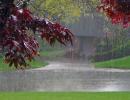The theme of the motherland in the works of Mayakovsky briefly. The theme of the motherland in the lyrics of V.V. Mayakovsky. Composition based on the work on the topic: The theme of the Motherland and the new man in the lyrics of Mayakovsky
Alexander Blok and Vladimir Mayakovsky are two great Russian poets. It is not easy to compare their work, because in ideological and stylistic terms they are very different from each other. If Blok belonged to the Symbolists (representatives of the most powerful literary movement of the late 19th-early 20th centuries) and his work was largely based on the traditions of the golden - Pushkin - age of Russian poetry, then Mayakovsky belonged to the circle of futurist poets calling for "throw Pushkin and Dostoevsky from the steamer of modern times." Each of these great poets had their own understanding of modernity, history and the role of poetry.
The only thing that unites them is their ardent love for the Motherland.
Blok's image of the Motherland is extremely complex, multifaceted and contradictory. The poet himself said that he devotes his whole life to this topic. Drunk, devout, looking mischievously from under a woman's headscarf, a beggar - such is Blok's Russia. And this is exactly how she is dear to him:
Yes, and such, my Russia,
You are dearer to me than all the edges, -
the poet admits in the poem "To sin shamelessly, unrestrainedly ...".
The poet passionately loved his country, united its fate with his: "My Russia, my life, shall we toil together? ..". In many of his poems about the Motherland, female images flicker: "No, not an old face and not lean under a Moscow colored scarf ..." ("New America"), "... patterned kerchief to the eyebrows ...", ".. .instant glance from under the scarf ... ".
The symbol of Russia in many of Blok's poems is reduced to the image of a simple Russian woman. By identifying these two images, the poet, as it were, animated the very concept of "Russia", bringing the so-called patriotic lyrics closer to love. In the poem "Autumn Day" he calls Russia his wife:
Oh my poor country
What do you mean to the heart?
Oh my poor wife
What are you crying about?
Of all Russian poets, only Blok has such an interpretation of the theme of love for the Fatherland. Fear, pain, longing and love to the point of madness - in every word, in every line.
Sometimes notes of the "supernatural" join this complex range of feelings. So, mystery, the complex interweaving of reality and mysticism shine through in the lines of the most remarkable, in my opinion, Blok's poem about the Motherland ("Rus"):
Russia is surrounded by rivers
And surrounded by wilds
With swamps and cranes,
And with the cloudy eyes of a sorcerer...
Where are the sorcerers with the soothsayers
Cereals enchant the Pole,
]L witches amuse themselves with devils
In road snow pillars.
Blok's Russia is unshakable, unchanging. But she also needs changes, which are mentioned in the 1916 poem "Kite":
Centuries go by, war rages,
There is a rebellion, the villages are burning,
And you are still the same, my country,
In the beauty of tear-stained and ancient -
How long will mothers grieve?
How long will the kite circle?
"Kite circling" was not long. A year after the poem was written, a revolution began. What awaits unfortunate Russia after it, what paths-roads will open before it? Blok did not know this for sure (although he foresaw a lot thanks to his ingenious intuition). Therefore, in his poem "The Twelve", glorifying the elemental revolutionary storm that will overwhelm the poet, its heroes, a patrol of twelve people, do not see where they are going:
And the blizzard dusts them in the eyes
Days and nights
All the way...
The old world that Block belonged to was destroyed. What the new world would be like, the poet could not imagine. The future turned out to be hidden by a veil of darkness and a bloody haze. Poetry - great, true - no one needs now, poems are not heard because of the sound of sentinel steps on the pavement, because of frequent shots and revolutionary songs. It is no coincidence that in the poem "Good" Mayakovsky wrote about this time:
Blok's Russia... Strangers,
the haze of the north went to the bottom,
debris and cans
canned food.
Mayakovsky himself also passionately loved his homeland, but in a different way than Blok. Blok's love is, as it were, directed to the past, while Mayakovsky said: Fatherland
which is, but three times -
which will be.
Unlike Blok, he firmly knew what the future of the country would be - it would be socialist and, of course, necessarily happy. In Mayakovsky's lyrical collections there is not a single poem that would glorify pre-revolutionary Russia. He himself and all her poetry are directed to the future. He selflessly loved contemporary Russia (more precisely, the Soviet Union). At that time, life in the country was difficult, there was famine and devastation, and Mayakovsky endured all the hardships and hardships together with his country and his people:
where is the air
like a sweet fruit drink
and you rush, wheeling, - but the earth,
with whom
frozen together, forever
you can’t stop loving ... I
this land
where and when he raised belly and goiter, but the earth,
with which
starving together, - you can’t
The poet visited abroad, saw a well-fed and luxurious life abroad, but his native land is dearer to him:
I would like to live
and die in Paris, if it weren't for
such land - Moscow.
Mayakovsky was incredibly proud of the fact that he lives in the only socialist country in the whole world. In his poems, he literally shouted: "Read, envy, I am a citizen of the Soviet Union!". And even though this “grimaced their mouths with a burn”, even though the young Soviet country still had many enemies, Mayakovsky firmly and sincerely believed that all difficulties would be overcome, devastation, famine, wars would disappear forever, and a bright communist future would come. All his poems about the Motherland are imbued with this faith, genuine optimism. The poet's dreams were not destined to come true, but nevertheless, this does not make his work less interesting to study and read.
In the lyrical works of the two greatest poets of Russia - Blok and Mayakovsky - Russia appears as a dear and painfully familiar homeland to everyone, fickle, seething, sobbing through bursting laughter, all aspiring to the future and ready at any moment to forget about the difficult past, understanding everything and everyone sorry.
Some of the most famous and beloved poets of the 20th century are Sergei Alexandrovich Yesenin and Vladimir Vladimirovich Mayakovsky. The poets lived in a difficult time for Russia: the First World War, then the revolution and civil war. All this happened before the eyes of the citizens of the country, everyone experienced these terrible years. The subtle spiritual organization of the poet could not but respond to these important events and reflect them in his work.
Since October 1917, the tone of Mayakovsky's poems has changed dramatically, a new stage in his work begins.
The pathos of the poems acquires other shades, the denial of a reality hostile to man is replaced by an ardent acceptance of the revolution and the changes that have begun. The poems of Vladimir Vladimirovich open up another Motherland for us. "Left March", "Stunning Facts" show Mayakovsky's faith in the power of the new world and the expectation of a brighter future. In "Poems about the Soviet Passport" Mayakovsky says:
"Read, envy,
I am a citizen of the Soviet Union!"
These lines sound such genuine pride for their country that there is no doubt about the deep sense of patriotism that lives in the heart of the poet.
Sergei Yesenin perceived the revolution differently, for him it became a force destroying his "blue Russia". Sergei Alexandrovich, born in the village, loved most of all Rus, rustic, simple. About her he says:
"Ineffable, quiet, gentle
My land is quiet after storms, after thunderstorms
And my soul is a boundless field,
Breathes the scent of honey and roses."
Even Yesenin's soul is part of his Motherland. Changes. what happened in the country frighten the poet, he does not feel necessary for the country, but still writes:
"I will sing
With the whole being in the poet
sixth of the earth
With a short name "Rus".
As we can see, Yesenin and Mayakovsky perceived their Motherland and the changes taking place with it in completely different ways. Mayakovsky sang of the revolution and the "new" Soviet Russia, looked forward to a brighter future for the citizens of a great country and was incredibly proud of it. The "citizen of the village", in turn, feels superfluous, but still his soul forever belongs to Russia. Poets of the 20th century - V.V. Mayakovsky and S. A. Yesenin are united by a sense of patriotism and boundless, albeit so different, love for the Motherland. This is perfectly reflected in the work of writers, and thanks to them we can experience the same as the whole country once did.
Blok, Yesenin and Mayakovsky are the largest Russian poets of the early 20th century. By the will of fate, they witnessed the largest historical events that fell to the lot of Russia: the revolution of 1905, the period of cruel reaction, the imperialist war, the February and, finally, the October revolution of 1917. Being great patriots, sincerely worrying about their homeland, these poets could not but reflect in their work the key moments in the history of Russia. Moreover, it seems to me that it is from the descriptions of such moments that the patriotic lyrics of Blok, Yesenin, Mayakovsky are formed.
Since October 1917, a new stage in the work of Mayakovsky begins, his tonality of poetry changes dramatically. The pathos of a decisive denial of a reality hostile to man, characteristic of the poet, its grotesque image is replaced by the complete acceptance of the fundamental changes that have begun in the country. “Ode to the Revolution”, “Left March”, “Mystery Buff”, “Stunning Facts” - in these works another Motherland is revealed, illuminated by faith in a wonderful future awaiting humanity.
Mayakovsky, as before, remained a romantic, but now the poet's romanticism is aimed at affirming the creation of a new world. The “extraordinary”, almost fantastic in his works of those years was born from the environment around him. That is why the images of his work are so voluminous. For Mayakovsky, the revolution was an opportunity to make life easier and brighter, it was supposed to save the people from the hated power of the well-fed. Here is how he writes in the poem "Stunning Facts":
In vain plump hands begged, -
Unstoppable in his silent career.
Republics and kingdoms taking barriers.
Sergei Yesenin perceived the changes that overtook his "blue Russia" in a different way. The lyrics of this poet are focused on depicting the dramatic fate of a person in a critical era, representing a kind of lyrical novel, the plot of which the poet made his biography, turning it into the story of "the poet Sergei Yesenin." His poems are a chronicle of life with its ups and downs.
Reading "Heavenly Drummer", "Jordan Dove", "Transfiguration" we feel that Yesenin welcomes great changes. But what does he see as their meaning? What does it mean - "accepted with a peasant bias"? The works written in the first years of the revolution are full of joyful hopes for the transformation of reality into a “village paradise”, where there are “green fields”, “herds of brown horses”, where “Apostle Andrei wanders” (“Jordanian dove”) with a shepherd’s pipe.
What are the essential aspects of the revolution reflected in Yesenin's work? The poet expressed the contradictions that were inherent in the Russian peasantry, who accepted the revolution, defended its gains, but sometimes harbored unrealizable social illusions.
The poet conveys his idea of the revolution with the image of a red horse - a romantic, fantastic image, but akin to the world of birches, bird cherry and maples, the world of Russian nature, that is, everything that formed the basis of Yesenin's poetry, embodied his ideas of beauty, his desire for a harmonious life .
Come down, appear to us, red horse! ..
... Oh, take out our globe of the earth
On a different track.
When Yesenin became convinced that the revolution would accelerate Russia's transition from the patriarchal track to the highways of modern machine technology, he took it painfully. Real revolutionary events, drastic changes in the countryside, even the elementary mechanization of the village - all this, in Yesenin's view, spoke of the death of a meek, created mainly by the imagination of the poet of patriarchal Russia. The collapse of this illusory idea of rural Russia was natural, but at the same time it seemed to the poet that an entire area of life had disappeared, and hence the area of feelings. Thus, he feared not the coming of the new, but the departure of the old.
Alexander Blok had his own perception of the new reality. In January 1918, Blok published an article "Intelligentsia and Revolution", in which he wrote about the great tasks facing the country. At the same time, he wrote the poem "The Twelve". It was the result of Blok's reflections on the revolution.
With great skill he conveys the revolutionary storm that has engulfed the entire country. Pictures of ruined life, raging nature, images of the old world make up the real situation in which the revolution is taking place. Blok's characteristic denial of the old world manifested itself in a satirical depiction of the bourgeoisie, a symbol of the past. Against the past, against the wind, through devastation and hunger, twelve people, twelve "apostles of the revolution", filled with the wrath of the people, are going. The revolutionary passion that has seized these people transforms them into soldiers.
The main theme and protagonist of the poem is the people in the revolutionary era. The story of the Red Guard patrol, walking through the streets of revolutionary Petrograd, takes on cosmic proportions. Blok derives the idea of the purifying fire of the revolution from the idea of retribution. With the help of the image of Christ, Blok tried to establish the revolution, since Christ is a symbol of morality, and twelve guardsmen are inextricably linked with him.
Thus, the theme of the Motherland in the works of Blok, Yesenin, Mayakovsky is expressed in different ways. But all these poets have in common that they closely intertwined this theme with the theme of the revolution. Each of the poets worried about the fate of his country, tried to see what awaits Russia, what the global changes that took place at the beginning of the 20th century bring to it.
like the spring of mankind,
born
in labor and in battle,
my fatherland
my republic!
V. Mayakovsky
Whatever V. Mayakovsky wrote about, the main theme in his poems was always the theme of the Motherland, since the poet, in his opinion, is not only a “leader of the people”, but also a “people's servant”. This great poet put his work in the service of his Motherland, his people, the revolution.
Mayakovsky cared little for abstract, general questions. He actively participated in the life of his country, was aware of all events, sincerely rejoiced at the achievements of the Soviet people, and strove to overcome "survivals". He was interested in specifics, and his works, in which he struggled with all sorts of "rubbish": bureaucracy, vulgarity, philistinism, selfishness, were just as extremely specific. The pen is a formidable weapon of poets, and Mayakovsky skillfully used it.
In his works, the poet often conducts a dialogue or addresses people of different professions, and we understand that these people are alive, with their own thoughts, doing a certain job in building a new world, often even showing heroism. Diligence, readiness for hardships in the name of achieving the cause, self-denial instill joy and optimism in the poet’s heart, faith in the creation of a “garden city” on earth:
I know - the city will be, I know - the garden will bloom when there are such people in the Soviet country!
Mayakovsky spoke of the “hellish” work done by the citizens of the young country: “we illuminate, clothe the poor and bare, the extraction of coal and ore is expanding.” According to the poet, in order for the old world to become a thing of the past, it is necessary to actively build a new world, and this is very difficult in the conditions of famine and devastation that reigned in the country after the imperialist war and in the first years after the revolution.
There, beyond the mountains of grief, there is no end of the sunny land. For hunger, for pestilence, the sea print a millionth step!
Mayakovsky feels his strong connection with the people, "with those who went out to build and take revenge in the continuous fever of everyday life." He also likes the “enormity” of the plans of the builders of a new life, and “the sweep of the steps of a sazhen”, and the march “by which we go to work and battles”. Being involved in the creation of the Fatherland, "which will be," Mayakovsky feels sincere joy:
Citizens! Today, the thousand-year-old "Before" is collapsing. Today the worlds basis is being revised. Today, to the last button in our clothes, we will redo life again.
Mayakovsky believed in his Land of Soviets. He dedicated to her not only creativity, but also life. The poet's poems are imbued with love for the Motherland, a feeling of deep patriotism, the desire to quickly lead it to a bright and happy future. material from the site
... the main thing in us is our Country of Soviets. Soviet will, Soviet banner, Soviet sun.Mayakovsky was sure that the time and efforts of his contemporaries to overcome everything obsolete and build a new one would not be in vain. Creativity is a great, divine thing, and joint creativity for Mayakovsky was not only necessary, but also sacred.
We go through the barking of revolvers, in order, dying, to be embodied in steamships, in lines and in other long deeds.
Didn't find what you were looking for? Use the search
On this page, material on the topics:
- Mayakovsky poems about the motherland analysis
- find popular expressions in Mayakovsky's work
- essay on the theme of the homeland in the work of Mayakovsky
- homeland in the works of Mayakovsky briefly
- essay on the theme of the homeland in the work of Mayakovsky
And I,
Like the spring of humanity
born
In labor and in battle,
I sing
My fatherland
My Republic!
V. Mayakovsky
Whatever V. Mayakovsky wrote about, the main theme in his poems was always the theme of the Motherland, since the poet, in his opinion, is not only a “leader of the people”, but also a “people's servant”. This great poet put his work in the service of his Motherland, his people, the revolution.
Mayakovsky cared little for abstract, general questions. He actively participated in the life of his country, was aware of all events, sincerely rejoiced at the achievements of the Soviet people, and strove to overcome "survivals". He was interested in specifics, and his works, in which he struggled with all sorts of “rubbish”: bureaucracy, vulgarity, philistinism, selfishness, were just as extremely specific. The pen is a formidable weapon of poets, and Mayakovsky skillfully used it.
In his works, the poet often conducts a dialogue or addresses people of different professions, and we understand that these people are alive, with their own thoughts, doing a certain job in building a new world, often even showing heroism. Diligence, readiness for hardships in the name of achieving the cause, self-denial instill joy and optimism in the heart of the poet, faith in the creation of a “garden city” on earth:
I know -
City
Will,
I know -
Garden
bloom,
When
Such
People
In the country
Soviet
There is!
Mayakovsky spoke about the “hellish” work done by the citizens of the young country: “we illuminate, clothe the poor and bare, the extraction of coal and ore is expanding.” According to the poet, in order for the old world to become a thing of the past, it is necessary to actively build a new world, and this is very difficult in the context of famine and devastation that reigned in the country after the imperialist war and in the first years after the revolution. There
Behind the mountains of grief
The sunny land is unfinished.
For the hunger
Beyond the sea
Print a millionth step!
Mayakovsky feels his strong connection with the people, "with those who went out to build and take revenge in the continuous fever of everyday life." He also likes the “enormity” of the plans of the builders of a new life, and “the sweep of the steps of a sazhen”, and the march “by which we go to work and battles”. Being involved in the creation of the Fatherland, “which will be,” Mayakovsky feels sincere joy:
Citizens!
Today, the thousand-year-old “Before” is crumbling.
Today the worlds basis is being revised.
Today
Down to the last button in your clothes
Let's redo life.
Mayakovsky believed in his Land of Soviets. He dedicated to her not only creativity, but also life. The poet's poems are imbued with love for the Motherland, a feeling of deep patriotism, the desire to quickly lead it to a bright and happy future.
… the main thing in us
This is our
Soviet country.
soviet will,
soviet flag,
Soviet sun.
Mayakovsky was sure that the time and efforts of his contemporaries to overcome everything obsolete and build a new one would not be in vain. Creativity is a great, divine thing, and joint creativity for Mayakovsky was not only necessary, but also sacred.
We are walking
Through the revolver bark
To,
dying
incarnate
on the steamships,
In lines
And in other long cases.
Didn't find what you were looking for? Check out the links below:
Essay on literature on the topic: The theme of the Motherland in the work of V. Mayakovsky
Other writings:
- Blok, Yesenin and Mayakovsky are the largest Russian poets of the early 20th century. By the will of fate, they witnessed the largest historical events that fell to the lot of Russia: the revolution of 1905, the period of cruel reaction, the imperialist war, the February and, finally, the October revolution of 1917. Being big Read More......
- I consciously and irrevocably dedicate my life to the theme of Russia. A. Blok I will sing with all my being in the poet One sixth part of the earth With a short name "Rus". S. Yesenin I sing my fatherland… V. Mayakovsky The theme of love for the motherland has always been close to the Russian people. Read More ......
- I met Mayakovsky's first poem at the age of five. Mom read to me “What is good and what is bad?”. I still remember many lines from it. Hundreds of bright lines of the poet from his poems entered our conversation, Read More ......
- Alexander Blok and Vladimir Mayakovsky are two great Russian poets. It is not easy to compare their work, since in ideological and stylistic terms they are very different from each other.
- Poetry - every day in a new way Favorite word. V. Mayakovsky Mayakovsky, like many of his poetic predecessors, was concerned about the question of the appointment of the poet and poetry. An innovator in many ways, in understanding himself as a poet, Mayakovsky is the successor to the positions of Pushkin, Lermontov, Nekrasov, who believe that the literary Read More ......
- Many poets thought about the purpose of creativity, about their place in the life of the country, the people. What and for whom a poet should write - these questions arose in ancient times at the same time as poetry itself. Poet or citizen? Poet and citizen? Poet – Read More ......
- If I wrote What, If I said What - That is the fault of the Heaven-Eyes, My Beloved Eye. V. Mayakovsky V. Mayakovsky is a poet of genius. His legacy is multi-dark and multi-genre, and therefore it is a shame that someone perceives Mayakovsky only as a poet-agitator or poet-satirist. The creativity of this Read More ......
- The poem clearly defines the role of poetry in the coming revolutionary battles. Mayakovsky, puts him among the great talents of the past; the poet's work opposes the experiments of the futurists, with whom fate brought him together. In the last two parts of the poem, Mayakovsky acts as a rebel against everything bourgeois Read More ......






